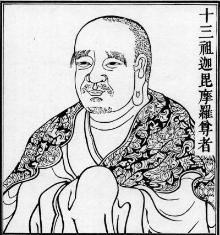Great Throughts Treasury
This site is dedicated to the memory of Dr. Alan William Smolowe who gave birth to the creation of this database.

Aśvaghoṣa NULL
Indian Philosopher, Poet and Sanskrit Dramatist
"The purpose of this discipline is to bring man into the habit of applying the insight that has come to him as the result of the preceding disciplines. When one is rising, standing, walking, doing something, stopping, one should constantly concentrate one’s mind on the act and the doing of it, not on one’s relation to the act, or its character or value. One should think: there is walking, there is stopping, there is realizing; not, I am walking, I am doing this, it is a good thing, it is disagreeable, I am gaining merit, it is I who am realizing how wonderful it is. Thence come vagrant thoughts, feelings of elation or of failure and unhappiness. Instead of all this, one should simply practice concentration of the mind on the act itself, understanding it to be an expedient means for attaining tranquillity of mind, realization, insight and Wisdom; and one should follow the practice in faith, willingness and gladness. After long practice the bondage of old habits become weakened and disappears, and in its place appear confidence, satisfaction, awareness and tranquillity. What is the Way of Wisdom designed to accomplish? There are three classes of conditions that hinder one from advancing along the path to Enlightenment. First, there are the allurements arising from the senses, from external conditions and from the discriminating mind. Second, there are the internal conditions of the mind, its thoughts, desires and mood. All these the earlier practices (ethical and mortificatory) are designed to eliminate. In the third class of impediments are placed the individual’s instinctive and fundamental (and therefore most insidious and persistent) urges - the will to live and to enjoy, the will to cherish one’s personality, the will to propagate, which give rise to greed and lust, fear and anger, infatuation, pride and egotism. The practice of the Wisdom Paramita is designed to control and eliminate these fundamental and instinctive hindrances."
"The world is his who can rid himself of covetousness."